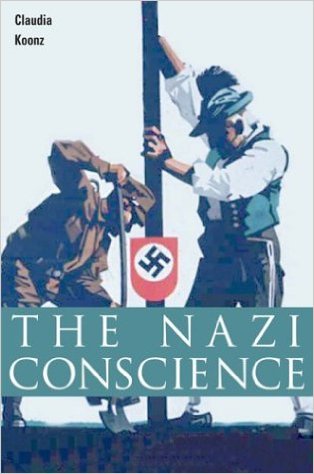Content note for antisemitism, Trump, eliminationist rhetoric.
I think that where Trump and Hitler really diverge from each other is in their sincerity. Trump has always been a con man and a reality show personality. There’s no doubt he’s a bigot and a racist, not to mention a complete misogynist, but those things weren’t tied to his political ambition from the beginning. In fact, he seems to have pursued politics only to revive his failing brand. And the outrageous shit he spews on an hourly basis is calculated to pander, to shock, to get people buzzing. He’s discovered it’s very easy to get his ego fed to bursting by being the most “politically incorrect” politician possible. He hasn’t spent his life dreaming of Muslim registries and letting the religious right overthrow our Constitutional rights. These just happen to be a few of the things that get people sleazy enough to follow him excited, so he pushes them.
Hitler, on the other hand, pursued political power early on. And from the start, he intended to slaughter as many Jews as he could manage.
“Once I really am in power, my first and foremost task will be the annihilation of the Jews.”
This is a goal Hitler never lost sight of even when circumstances forced him to dial down his overt antisemitism. But when whipping up his followers, he knew hate sells. He used it freely. He spent years blaming all of Germany’s woes on Jewish people. And Germany, defeated and humiliated in the first World War, had plenty of woes. They were far worse off than we are. Desperate people need scapegoats; Hitler offered them up.
Hitler shouldn’t have been around to provide them. After fomenting hatred of the Jews for several years, he made a premature attempt at revolution that ended with him facing high treason charges. He should have been tossed in prison for life or deported. But he figured out what he needed to say in order to gain the court’s sympathies. He learned that with people outside the Nazi party, it was best to dial back the rabid bigotry and appeal to ethnic pride.
Over the next six weeks, Hitler, the uncouth agitator, remade himself into an innocent patriot who had been betrayed by a democracy too weak to defend Germanic honor…. Hitler transformed his public self from a raging antisemite into a resolute tribune of the Volk who captivated audiences with his vision of “cleanliness everywhere, cleanliness of our government, cleanliness in public life, and also this cleanliness in our culture… that will restore our [national] soul to us.”
Of course, “cleanliness” meant purging the Jewish people, but he wasn’t so crude as to actually say that in front of non-Nazis whose esteem he had to win. Instead, he attacked more widely despised and impersonal things: the Versailles Treaty, Bolshevism, and liberals. He cast himself as the doughty patriot willing to sacrifice anything to protect his beloved volk. He sprinkled in appeals to Germany’s proud military past, and finished with an appeal to “the goddess of the eternal tribunal of history.”
He’d found all the right buttons to push. And so, instead of spending the rest of his life moldering in a Bavarian prison or thrown out of Germany with no hope of returning, he received a mere slap on the wrist: five years in prison without subsequent deportation.
So what are we seeing? That a clever fascist will tailor his appeals to his audience. All it takes to rally nascent fascists who won’t respond to overt bigotry and racism is an appeal to be the hero fighting those things they abhor: liberals, socialists, Marxists, and other assorted lefties. Sprinkle in a hefty dose of national, ethnic, and military pride, and you can get conservatives to bless even outright treason.
Sound familiar? It should. Trump is far cruder, but he plays the tune Hitler wrote. Not surprising, considering how much he reportedly admires the genocidal shit.
We’ll see next how Hitler reassured his followers that yes, he still hated Jews. It’s a reminder to never take Trump at his word when he dials back his hatred to pander to less hateful audiences.
We’re studying The Nazi Conscience as a way to prepare for what’s happening now. If you want to read along, you can pick up an inexpensive used copy at Amazon. Buying through that link also supports my blogging, so thank you!
Intro • Prologue • 1.1 • 1.2 • 1.3 • 2.1


